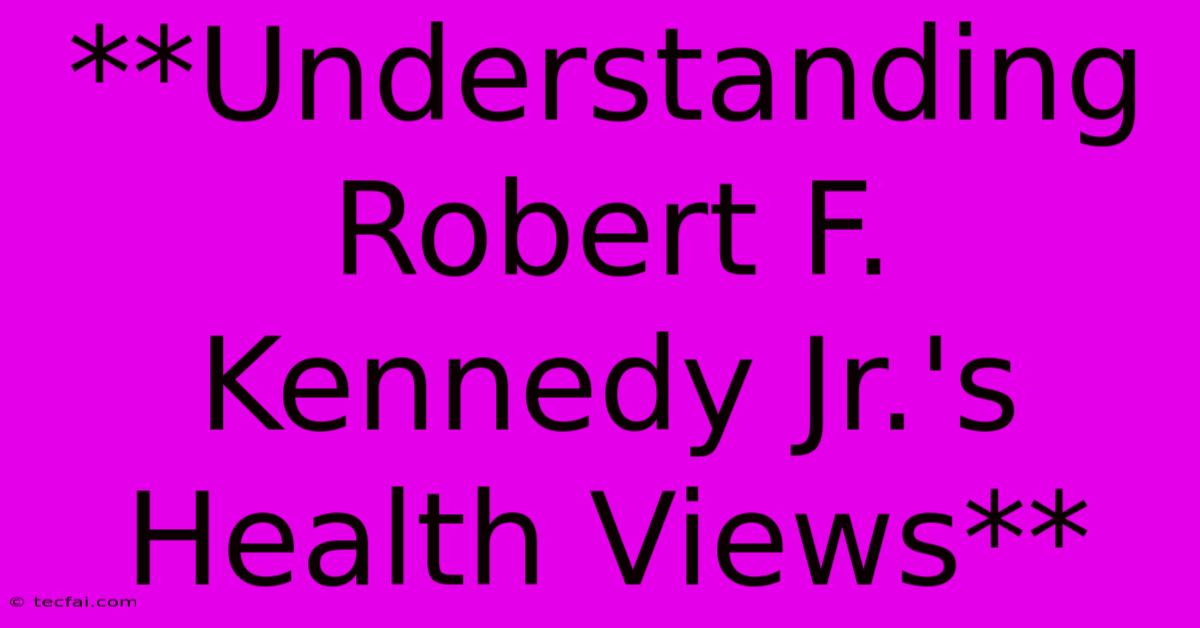**Understanding Robert F. Kennedy Jr.'s Health Views**

Discover more detailed and exciting information on our website. Click the link below to start your adventure: Visit Best Website tecfai.com. Don't miss out!
Table of Contents
Understanding Robert F. Kennedy Jr.'s Health Views: A Look at Controversy and Advocacy
Robert F. Kennedy Jr., a renowned environmental lawyer and activist, is a prominent figure in the realm of health advocacy. While his work on environmental issues is widely recognized, he has also become a controversial figure due to his views on vaccines and other health topics. This article delves into Kennedy Jr.'s stance on these issues, exploring the motivations behind his activism and examining the controversies surrounding his claims.
A Legacy of Advocacy and a Focus on Environmental Health:
Kennedy Jr. comes from a family deeply involved in public service, inheriting a legacy of advocacy from his father, Robert F. Kennedy. He initially established himself as a prominent environmental advocate, gaining recognition for his work on issues like mercury pollution and toxic waste. His activism in this field has earned him widespread respect and accolades, positioning him as a leading voice in environmental protection.
The Vaccine Controversy and the Rise of Anti-Vax Sentiment:
However, Kennedy Jr.'s views on vaccines have generated significant controversy. He has publicly expressed skepticism about the safety and effectiveness of certain vaccines, particularly the MMR vaccine. This stance has placed him at the forefront of the anti-vaccine movement, a movement that has been criticized for spreading misinformation and contributing to a decline in vaccination rates.
Kennedy Jr.'s Arguments:
Kennedy Jr. cites several reasons for his skepticism, focusing on:
- Vaccine ingredients: He expresses concern about the presence of mercury-containing preservatives like thimerosal in some vaccines, although thimerosal has been largely removed from vaccines used in the United States.
- Scientific research: He points to studies that he believes demonstrate a link between vaccines and autism, although the scientific consensus overwhelmingly refutes this claim.
- Government influence: He suggests that the government and pharmaceutical industry have a vested interest in promoting vaccinations, despite potential risks.
The Scientific Consensus and Counterarguments:
The overwhelming consensus of the scientific community, including the World Health Organization (WHO) and the Centers for Disease Control and Prevention (CDC), firmly supports the safety and effectiveness of vaccines. Studies have debunked the link between vaccines and autism, and evidence points to the significant benefits of vaccination in preventing serious diseases.
The Importance of Evidence-Based Decision Making:
While Kennedy Jr.'s activism has raised awareness about certain aspects of health and environmental issues, it's crucial to rely on evidence-based information and the consensus of the scientific community when making decisions regarding healthcare.
Moving Forward: Bridging the Gap and Promoting Informed Discussion:
The debate surrounding vaccines is complex and often driven by emotions. It's important to engage in open dialogue, respecting different perspectives while emphasizing the need for evidence-based decision making. Public health officials and healthcare providers can play a critical role in promoting accurate information and fostering informed discussions about vaccines.
Beyond Vaccines: Exploring Kennedy Jr.'s Broader Health Views:
Beyond his views on vaccines, Kennedy Jr. also advocates for other health-related issues. He has been a vocal critic of the use of genetically modified organisms (GMOs) in food and has spoken out against the impact of industrial agriculture on human health and the environment. He is also a proponent of organic farming and sustainable food systems.
A Complex Figure: Balancing Advocacy and Controversy:
Robert F. Kennedy Jr. is a complex and controversial figure. His unwavering commitment to environmental protection and his willingness to challenge established narratives have earned him respect, while his views on vaccines have drawn criticism and controversy. While some may disagree with his positions, his activism has undeniably brought important issues to the forefront of public debate. Ultimately, understanding the complexities of his views and the motivations behind his activism can provide valuable insights into contemporary health and environmental concerns.

Thank you for visiting our website wich cover about **Understanding Robert F. Kennedy Jr.'s Health Views**. We hope the information provided has been useful to you. Feel free to contact us if you have any questions or need further assistance. See you next time and dont miss to bookmark.
Featured Posts
-
Enter To Win 4 Million Lake District House
Nov 15, 2024
-
Paraguay Holds Messi Argentina Ratings
Nov 15, 2024
-
Say Nothing The Political Thriller You Need
Nov 15, 2024
-
Watch Jake Paul Vs Tyson Weigh In Live
Nov 15, 2024
-
England Faces Kolisi Led Springboks
Nov 15, 2024
